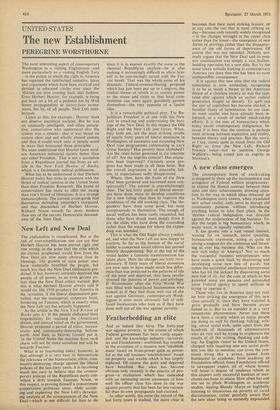UNITED STATES
The new Establishment
PEREGRINE WORSTHORNE
The most interesting aspect of contemporary Washington to a visiting Englishman—and more particularly to a visiting English Tory —is the extent to which the right in America has regained the intellectual initiative. Ideas and arguments which have been mocked and derided in educated circles ever since the 'thirties are now coming back into fashion. Even Herbert Hoover, for example, is being put back on a bit of a pedestal not by Wall Street propagandists or laissez-faire econo- mists, but by, of all people, New Left intel- lectuals.
Listen to this, for example: Hoover 'does not deserve uncritical acclaim. But he was an unusually intelligent, and often percep- tive, conservative who understood that the system was a system : that it was based on certain clear and not wholly absurd axioms and that it could work only if people acted in ways that honoured these principles . . . We must understand that Hoover knew mod- ern American industrial society better than any other President.' This is not a quotation from a Republican journal but from an art- icle in the New York Review of Books, which is a ferociously radical publication.
What has to be understood is that Herbert Hoover today has more in common with the thrust of radical opinion in the United States than does Franklin Roosevelt. His brand of conservatism has more to offer the young
than FOR'S brand of liberalism. It is a strange
metamorphosis. The current avant-garde find themselves defending yesterday's rearguard, and that descendant of Herbert Hoover, Richard Nixon sounds far more Modern than any of the current Democratic descend- ants of the New Deal.










































 Previous page
Previous page